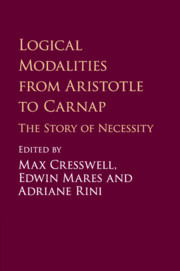Book contents
- Frontmatter
- Contents
- List of Figures and Tables
- List of Contributors
- List of Abbreviations
- Introduction
- 1 Aristotle on the Necessity of the Consequence
- 2 Aristotle on One- Sided Possibility
- 3 Why Does Aristotle Need a Modal Syllogistic?
- 4 Necessity, Possibility, and Determinism in Stoic Thought
- 5 Necessity in Avicenna and the Arabic Tradition
- 6 Modality without the Prior Analytics: Early Twelfth Century Accounts of Modal Propositions
- 7 Ockham and the Foundations of Modality in the Fourteenth Century
- 8 Theological and Scientific Applications of the Notion of Necessity in the Mediaeval and Early Modern Periods
- 9 Locke and the Problem of Necessity in Early Modern Philosophy
- 10 Leibniz's Theories of Necessity
- 11 Leibniz and the Lucky Proof
- 12 Divine Necessity and Kant's Modal Categories
- 13 Charles Sanders Peirce on Necessity
- 14 The Development of C. I. Lewis's Philosophy of Modal Logic
- 15 Carnap's Modal Predicate Logic
- Bibliography
- Index
8 - Theological and Scientific Applications of the Notion of Necessity in the Mediaeval and Early Modern Periods
Published online by Cambridge University Press: 05 September 2016
- Frontmatter
- Contents
- List of Figures and Tables
- List of Contributors
- List of Abbreviations
- Introduction
- 1 Aristotle on the Necessity of the Consequence
- 2 Aristotle on One- Sided Possibility
- 3 Why Does Aristotle Need a Modal Syllogistic?
- 4 Necessity, Possibility, and Determinism in Stoic Thought
- 5 Necessity in Avicenna and the Arabic Tradition
- 6 Modality without the Prior Analytics: Early Twelfth Century Accounts of Modal Propositions
- 7 Ockham and the Foundations of Modality in the Fourteenth Century
- 8 Theological and Scientific Applications of the Notion of Necessity in the Mediaeval and Early Modern Periods
- 9 Locke and the Problem of Necessity in Early Modern Philosophy
- 10 Leibniz's Theories of Necessity
- 11 Leibniz and the Lucky Proof
- 12 Divine Necessity and Kant's Modal Categories
- 13 Charles Sanders Peirce on Necessity
- 14 The Development of C. I. Lewis's Philosophy of Modal Logic
- 15 Carnap's Modal Predicate Logic
- Bibliography
- Index
Summary
In the mediaeval and early modern periods the notion of necessity was found important in both theological and scientific areas. For the mediaevals, following Aristotle, a scientific result had to be deduced from universal, necessary principles via a valid syllogism, to yield a universally necessary conclusion:
It is clear [said Aristotle] that if the propositions from which a deduction proceeds are universal, then it is necessary for the conclusion of such a demonstration … to be eternal. There is therefore no demonstration of perishable things, nor any understanding of them simpliciter but only incidentally, because nothing holds of them universally but only at some time and in some way.
In the late fifteenth century Petrus Garsia, bishop of Ussellus in Sardinia, noted that this left experimental results outside the scientific fold: “To assert that … experimental knowledge is science or a part of natural science is ridiculous … [Experimental knowledge] according to those of that opinion, is practical knowledge, whereas natural science in itself and in all its parts is purely speculative knowledge.” This view was still held in the early modern period, especially among the writers of logic texts, although others, following Francis Bacon, pointed to natural philosophy's need for a new notion of demonstration.
Theologically, the derivations of truths about God and God's relation to humanity provided examples of necessity, but another, distinct, modal notion was also in play, that of necessary existence, which remained an important notion, theologically, throughout the early modern period. For the mediaeval views I shall concentrate on Aquinas, whose writings provide us with a variety of senses, sometimes overlapping, of necessity, and which also provide a clear account of the notion of necessary existence.
Necessity and Necessary Existence in Aquinas
There are a number of senses of necessity in Aquinas and other mediaeval authors. Here I consider four which remained important in the early modern period: necessity as the self-evident, tensed necessity, absolute necessity, and necessary existence.
Self-Evidence
Thomas notes that “self-evident” truths need not be obviously self-evident: necessary truths may be difficult to discover. Effectively dismissing the ontological argument when considering the question “Whether the existence of God is self-evident?”
- Type
- Chapter
- Information
- Logical Modalities from Aristotle to CarnapThe Story of Necessity, pp. 154 - 173Publisher: Cambridge University PressPrint publication year: 2016
- 1
- Cited by



